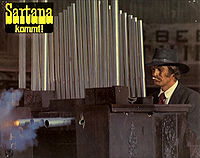Light the Fuse... Sartana is coming Review
Light the Fuse... Sartana is coming (Una Nuvola di polvere... un grido di morte... arriva Sartana)

|
| LIGHT THE FUSE...SARTANA IS COMING (1971) |
Cast:
Music:
Director:
|
According to French author Giré (1), this is one of the richest outings illustrating the evolution of the Italian western. While inheriting some of genre’s mythologies, established during its heydays, it also adopts some of the more parodist aspects of the genre, brought into vogue more recently, culminating in an outrageous scene in which Sartana transforms an organ into a sophisticated machine gun. Baroque and flamboyant, occasionally flirting with travesty, the film probably isn’t innovative, but it’s important in the sense that the genre seems to reach its logical conclusion here.
The story is vintage Sartana. There’s the traditionally over-complicated plot with its double-crosses and ever-changing alliances. And there’s of course our black-clad hero with a new array of weapons and gadgets, including a miniature robot in the form of totem called Alfie, who can be programmed to kill. Sartana is looking for half a million of gold and two million dollars of counterfeit money, embezzled by his former mentor called Grandeville Full, Grand Full for short. Sartana is not the only one who is keen on the money, there’s also a sneaky widow, a sheriff, a one-eyed drifter and a group of would-be revolutionaries led by a deaf and slightly deranged general Monk, a kind of Baron Münchausen spaghetti western style. Sartana’s only trustworthy ally, an old timer called Pon Pon, discovers an indication in the form of a device that reproduces, in a symbolic way, the depository of the money, but he is killed before he can reveal his discovery to Sartana …

|
The fourth and last Sartana movie with Garko, probably is the most crack-brained of the entire series, but Sartana himself is presented as a more worldly character than in the previous movies. He’s no longer the phantom like stranger with a supernatural gift to pop up in the right place at the right time, but a more human creature, possibly even vulnerable. He really looks pissed off when he’s beaten up like No Name in A Fistful of Dollars (the first of a series of references to Leone’s movies). The story, although still gimmick-ridden, is more constructed like a detective story, and Sartana has been given some of the dry wit of the classic sleuth too. It suites him fine, but the combination of a more down-to-earth approach of the character and the ultimate goofiness of some of the gadgets is a bit confusing, turning Light the fuse … into a rather erratic movie experience.
To my personal taste this entry is a bit too relaxed, too goofy at times, and I prefer the darker edge of some of the earlier movies. This doesn’t mean this is a bad movie, far from it. There’s hardly a dull moment and with its underground prison cells and fancy costume design the film has a nice, sophisticated look, offering even some real rocks instead of the traditional sandpits (if I’m not mistaken this is the only Sartana adventure that made the trip to the beloved Spanish locations). Among the nicest references to the Leone movies is the presence of Mara Krupp, the lady with the big nose & knockers, who reprises her part as the horny hotel woman from For a Few dollars More. The finale, with Garko cleaning up the town’s main street with his organ, probably oversteps the line between parody and travesty, but nevertheless is a witty reference to the scène in Django, with Franco Nero digging up his machine gun from his coffin. The traditional and modernist influences are perfectly fused in a scene in which a man – the fastest gun in town – is ‘unarmed’ by shooting off his belt and pants, a reference to the irreverent gags of the Trinity movies as well as the sadistic scene from Once upon a Time in the West in which Wobbles is executed by Frank. Like the movie, Bruno Nicolai’s score seems to combine more traditional and more modernist elements. I wasn’t impressed by all of it, but the theme music is particularly fine. Franco Pesce as Pon Pon and Nieves Navarro as the deliciously wicked widow stand out in a first rate spaghetti western cast. Garko simply is Sartana by now, and José Jaspe’s Monk may well be the most deliriously insane character ever spotted in western east of the Rocky Mountains. I wasn’t very fond of Alfie, by the way.
Reviewed Version: The German Simple Movie DVD presents the movie in its OAR of 2,35:1. Overall it’s a pleasing transfer, a few hairs, specks and an occasional vertical line are virtually all as far as print damage is concerned. Colours come through rather strong, although there are a few scenes in which they have faded. In those scenes sharpness and contrast rates drop too, but the scenes are few and far between and the problems never really spoil the fun. There are three audio tacks, German, Italian and English DD 2.0. The Italian and English audio tracks have forced German subtitles. Neither of these is really great, nor free from hiss and other disturbing noises, but on the German track dialogue is at least loud and clear, which makes it the most pleasing of the three. I had to strain my ears on a few occasions to understand what was being said on the other two audio tracks.
Note:
- (1) Jean-François Giré: Il était une fois le western européen, Paris 2008
The SARTANA series:
|
--By Scherpschutter
Page Design by dicfish





